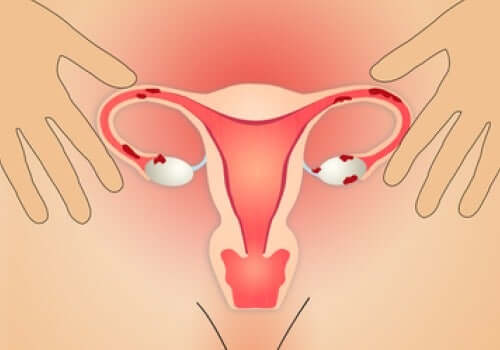Blood Clots During Your Period: 5 Things you Should Know


Written and verified by psychologist Valeria Sabater
While it can seem scary, the presence of blood clots during menstruation is normal for most women. Still, it’s something you should keep an eye on to see if they are accompanied by any other symptoms.
It never hurts to check in with your gynecologist. However, as experts explain, every body is unique and every woman will experience her period in her own way. As such, the presence of blood clots isn’t necessarily something to be alarmed about. We’ll tell you everything you need to know in this article.
Blood clots during your period: what are they?
Pay attention to the following facts about blood clots during your period to better understand them:
- The walls of your uterus tend to change little by little to prepare for a possible pregnancy. They become thicker and fill with new tissue to support a fetus in the event of conception.

- In the absence of a pregnancy, your body slowly releases the extra layers from the lining of your uterus. This is what we call menstruation.
- When your body suffers from a wound, your blood tends to clot. This is your body’s natural defense to keep you from losing too much blood. During your period, however, the blood needs to flow more freely in order to be expelled.
- As a result, your uterus produces an anticoagulant. If your period is very heavy, this anticoagulant runs out and you’ll likely notice some blood clots.
- These clots often vary in size from 5 mm to 2 inches, and are more common in women who have very heavy periods. Those with lighter periods may never experience these symptoms.
- Another point to remember is that the clots are often formed while you sleep. As such, your body may sometimes form a larger, thicker mass, which can be alarming. Equally, it’s also normal for your period to disturb your sleep.
Things you should know about blood clots during your period

1. Iron deficiency
A lack of iron can be a real headache for women.
- It’s common for a heavy period to lower your iron levels. The less iron you have in your body, the harder it is for your uterus to generate its “natural anticoagulant”. As such, iron-deficiency anemia can cause more blood clots to form.
- Make sure to monitor your iron levels on a regular basis. If your iron levels are low, take supplements as recommended by your doctor.
2. Small hormonal imbalances
It’s common for both women who have recently given birth and teenage girls to have issues with blood clots.
This is due to small imbalances in estrogen and progesterone, which can also occur just before menopause.
3. Miscarriage
This is an important aspect to keep in mind. If you’re trying to conceive and notice a yellow or grayish clot, it could signal a miscarriage. Never hesitate to consult with your doctor or gynecologist.
4. Endometriosis
Endometriosis is a silent disease that millions of women suffer from. If your periods are extremely painful and debilitating, it’s possible that you suffer from this ailment.
- Endrometriosis affects the female reproductive organs. It leads to the formation of very dense lesions around the uterus and other nearby organs. All of this causes pain, and commonly causes a large number of blood clots during menstruation.

5. Gynecological diseases
As we mentioned at the beginning of this article, the presence of blood clots during menstruation is common for many women. Still, if your periods are painful, you should always discuss it with your gynecologist.
- Pelvic inflammatory disease, for example, often causes abdominal pain in the pelvic region. It is also related to the presence of menstrual clots.
- Caused by a type of bacteria, this disease results in an infection that spreads from the cervix to the uterus, ovaries, or fallopian tubes.
- This painful disease is one of the most common gynecological diseases. As such, if you’re ever in doubt or in pain, it’s important to consult with a professional.
Also discover what causes abdominal pain on the left side
The presence of myoma or cysts is also related to the presence blood clots during your period. So, even though clotting can be normal, it never hurts to mention it when you have your annual check-up.
All cited sources were thoroughly reviewed by our team to ensure their quality, reliability, currency, and validity. The bibliography of this article was considered reliable and of academic or scientific accuracy.
- Sleep Foundation. https://www.sleepfoundation.org/articles/las-mujeres-y-el-sueno
- Moreira, V.F., López San Román, A. (2009). Anemia ferropénica. Tratamiento. http://scielo.isciii.es/scielo.php?script=sci_arttext&pid=S1130-01082009000100010
- VV.AA. (2012).Obesidad y niveles séricos de estrógenos; importancia en el desarrollo precoz del cáncer de mama.http://scielo.isciii.es/scielo.php?script=sci_arttext&pid=S0212-161120120004000
- Bouquet de Durán, Romina Izzedin. (2012). Aborto espontáneo. http://www.scielo.org.pe/scielo.php?script=sci_arttext&pid=S1729-48272012000100007
- Biblioteca Nacional de Medicina de Estados Unidos. https://medlineplus.gov/spanish/ency/article/000888.htm
This text is provided for informational purposes only and does not replace consultation with a professional. If in doubt, consult your specialist.








